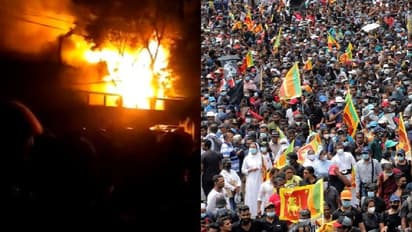Sri Lankan PM Wickremesinghe's private residence in Colombo set on fire by protestors

Synopsis
The incident came hours after Sri Lankan PM Ranil Wickremesinghe offered to resign to make way for an all-party government, as protests intensified in the country for the resignation of the government led by President Gotabaya Rajapaksa.
A group of protesters on Saturday entered the private residence of Sri Lankan Prime Minister Ranil Wickremesinghe in Colombo and set it on fire amid a massive public protest in the country over the unprecedented economic crisis.
Also read: Sri Lankan PM Wickremesinghe willing to resign; make way for all-party government
The incident came hours after Wickremesinghe offered to resign to make way for an all-party government, as protests intensified in the country for the resignation of the government led by President Gotabaya Rajapaksa.
The protestors entered Wickremesinghe's house and set the place on fire after a tense situation erupted between the protestors and security forces on the ground. Despite tear gas being fired on the protestors to disperse, they entered his house and set the house on fire.
Earlier in the day, anti-government protesters entered the Presidential House in Colombo. The president's whereabouts were unknown and it is believed the 73-year-old leader left the house before the massive mob arrived.
Also read: Sri Lanka: Hundreds storm Rajapaksa's official resident; President 'flees' in navy ship
Meanwhile, with no other political solution in sight, Wickremasinghe, who was appointed by President Gotabaya Rajapaksa in May to fix the island nation's bankrupt economy, offered to step down. Wickremesinghe was appointed by the president after his elder brother Mahinda Rajapaksa was forced to resign in May, amidst massive anti-government protests.
The Prime Minister's Media Division said that Wickremesinghe will resign after an all-party government is established and a majority is secured in Parliament.
Wickremesinghe told Opposition party leaders that he was taking the decision to step down as the island-wide fuel distribution is due to recommence this week, the World Food Programme Director is due to visit the country this week and the debt sustainability report for the International Monetary Fund is due to be finalised shortly.
Wickremesinghe said in a voice statement that he will resign when all parties have agreed on a new government.
Meanwhile, Sri Lanka's Parliament Speaker Mahinda Yapa Abeywardena on Saturday asked president Gotabaya Rajapaksa and Prime Minister Wickremesinghe to resign immediately to make way for an all-party government.
Abeywardena in a letter to Rajapaksa informed him about the outcome of the party leaders' meeting he had convened this evening after which Wickremesinghe offered to resign and form an all-party government.
Abeywardena told Rajapaksa that party leaders wanted him and Wickremesinghe to resign immediately, Parliament to be convened in seven days to appoint an acting president, appoint an interim all-party government under a new Prime Minister commanding majority in Parliament. It was also decided to call for elections within a short period of time and install a new government.
Opposition leader Raul Hakeem told reporters that party leaders wanted both President Rajapaksa and Prime Minister Wickremesinghe to resign and Speaker Abeywardena to become acting president as per the Constitution.
The Constitution stipulates under article 40C that the Prime Minister must act as the President until Parliament could appoint an acting president within one month of president vacating office.
However, the Opposition is opposed to Wickremesinghe becoming interim president as the people did not elect him. He entered Parliament as an appointed member having failed to win a seat in the parliamentary election held in August 2020.
At least 45 people, including seven security personnel, were injured in clashes between security forces and the protesters who had gathered in large numbers in the Fort area, demanding President Rajapaksa's resignation.
Sri Lanka, a country of 22 million people, is under the grip of an unprecedented economic turmoil, the worst in seven decades, crippled by an acute shortage of foreign exchange that has left it struggling to pay for essential imports of fuel, and other essentials.
(With inputs from PTI)
Check the Breaking News Today and Latest News from across India and around the world. Stay updated with the latest World News and global developments from politics to economy and current affairs. Get in-depth coverage of China News, Europe News, Pakistan News, and South Asia News, along with top headlines from the UK and US. Follow expert analysis, international trends, and breaking updates from around the globe. Download the Asianet News Official App from the Android Play Store and iPhone App Store for accurate and timely news updates anytime, anywhere.